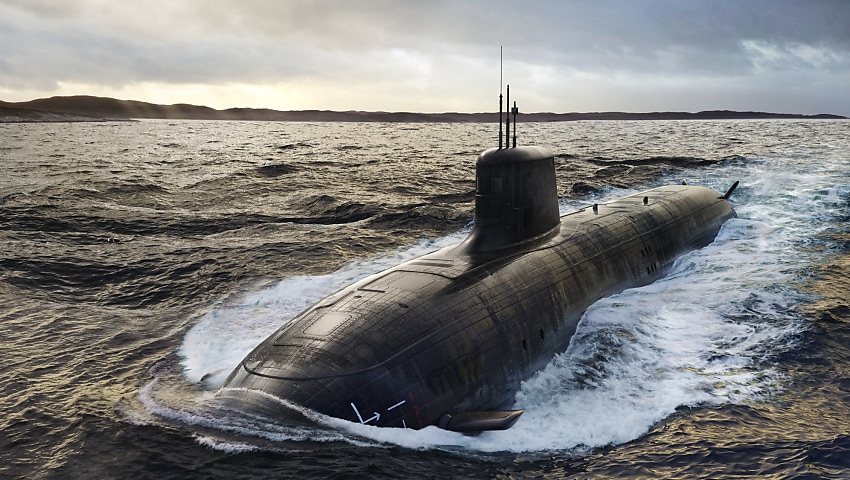Defence Minister Richard Marles and Defence Industry Minister Pat Conroy have announced the build and sustainment partners for the nation’s nuclear-powered submarine program.
To continue reading the rest of this article, please log in.
Create free account to get unlimited news articles and more!
Defence Connect can confirm that BAE Systems and the ASC have been selected to build Australia’s fleet of SSN‑AUKUS submarines through a joint venture, bringing together the two companies to maximise the unique and complementary capabilities, skills, expertise, and resources of the two partners.
The ASC and BAE, and once established, the joint venture, will operate collaboratively within a wider enterprise and be accountable and responsible for the delivery of Australia’s SSN‑AUKUS submarines, as well as ensuring safety, security, and regulatory compliance throughout the build program.
Deputy Prime Minister and Defence Minister, the Honourable Richard Marles MP said, “At the heart of today’s announcement are Australian jobs and a pipeline of work for local Australian industry as we deliver on the commitment to build and sustain submarines here in Australia – and create a sovereign industry and workforce.”
These partnerships mark the start of further extensive opportunities for Australian industry and workers, underpinning the single biggest capability acquisition in our nation’s history and creating around 20,000 direct jobs over the next 30 years, supporting the government’s vision for a future made in Australia.
Unpacking this further, Minister for Defence Industry, the Honourable Pat Conroy MP, said, “This announcement today is further evidence that the AUKUS agreement continues to be implemented at pace by all three partners, paving the way for the creation of more than 20,000 highly skilled jobs for decades to come.”
Charles Woodburn, BAE Systems chief executive, welcomed the announcement saying, “Drawing on decades of experience in the UK and Australia, we look forward to working with ASC to develop an enduring, sovereign nuclear-powered submarine building capability for Australia. We’re already making good progress on the design and development of the next-generation submarine in the UK where we have more than 1,000 people working on the SSN-AUKUS program and major infrastructure investment underway.”
The UK Ministry of Defence awarded BAE Systems almost £4 billion (AU$7.7 billion) for the next phase of the SSN-AUKUS program in October. This funding covers development work through to 2028, enabling BAE Systems to progress the detailed design phase of the program and procure long-lead items.
The award is also funding significant infrastructure investment in Barrow, which will see the site’s facilities double in size from 80,000 to 160,000 square metre by the late 2030s, as part of a multi-billion-pound program, and continued recruitment to support this transformative national endeavour.
Additionally, the government has also announced that ASC has been selected as the sustainment partner for Australia’s fleet of nuclear-powered submarines, beginning with the Virginia Class and followed by the SSN-AUKUS.
This will include significant workforce growth and the development of skills, knowledge, and experience required to sustain Virginia Class submarines, following the passage of the National Defense Authorization Act (NDAA) in December 2023, which included exemptions for Australian workers to sustain US submarines – an activity never before enabled under US legislation.
As part of this, ASC employees will have the opportunity to train and develop skills via an embed program at the Pearl Harbor Naval Shipyard in Hawaii to train on sustainment of US conventionally-armed, nuclear-powered submarines.
In order to support the development of this nuclear capable workforce, the government announced a suite of training initiatives and programs designed to “uplift” Australia’s defence industrial base and submarine workforce as a whole, including:
- A non-destructive testing traineeships to grow the testing technician workforce.
- The Welding Aptitude Testing Initiative, providing entry-level workers and mid-career skilled workers opportunities to test their skills and explore welding careers in shipbuilding.
- A welding bridging initiative for new entrants, existing workers, and advanced apprentices in adjacent industries to uplift their skills to fill welding roles in shipbuilding and the nuclear-powered submarine program.
Meanwhile, international placements will be available through a “train the trainer” pilot that will provide opportunities for Australia’s VET teacher workforce to conduct short-term placements in the US to enable them to build an understanding of AUKUS trilateral training requirements and methods and support students with understanding nuclear-powered submarine career pathways.
Defence Minister Richard Marles said, “The announcement of the sovereign submarine build and sustainment partners is opening up more avenues for Australian industry and jobs. What AUKUS is doing is allowing Australian industry to further invest here, but there are opportunities also opening up with our UK and US partners.”
The ASC will also provide sustainment support to visiting US and UK submarines at HMAS Stirling, in the lead-up to the establishment of Submarine Rotational Force-West from 2027.
Going further, Defence Industry Minister Pat Conroy said, “It is particularly significant that the first work undertaken by Australian industry in relation to the build and sustainment program will be for our AUKUS partners, underscoring the immense opportunities for Australian industry and workers.
“This is a critical step that underscores the Albanese government’s commitment to maximising opportunities for Australian industry and creating jobs and ensures construction of Australia’s first SSN‑AUKUS submarine can begin in Australia before the end of this decade,” Minister Conroy added.
Partnering with the US and UK industry will be an important element of our sovereign build and sustainment partners growing the specialist skills and capacity required to build and sustain nuclear-powered submarines, leveraging their decades of expertise.
All work by Australian personnel in the UK and US will remain consistent with Australia’s domestic and international legal obligations, including with respect to nuclear non-proliferation.

 Login
Login







